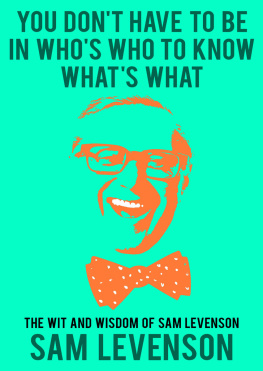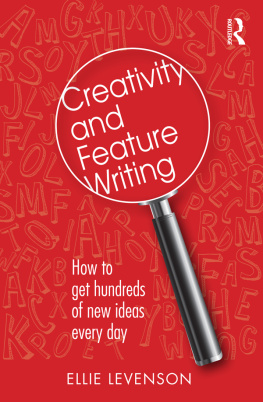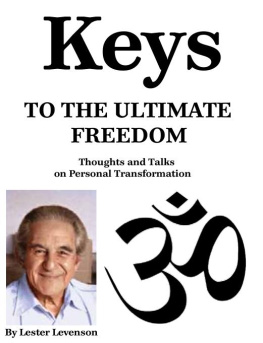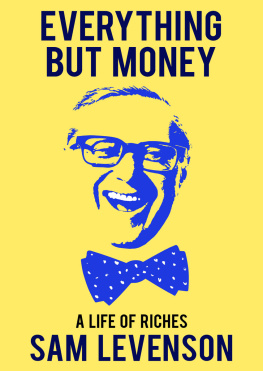You Dont Have to Be in Whos Who to Know Whats What
The Choice Wit and Wisdom of Sam Levenson
Sam Levenson
To
the Memory of
My Brother, David ,
Brother to All Mankind
and
a
Mench
for All Time
ALSO BY Sam Levenson
In One Era and Out the Other
Sex and the Single Child, illustrated by Whitney Darrow, Jr. (reissued in trade paperback under the title A Time for Innocence)
Everything But Money
You Can Say That Again, Sam
Acknowledgments
To my familyEsther, Conrad, Isabella, Emily, Georgia and Elias.
To my brothers and sister, especially to brother Albert, who typed, pasted, scissored and deciphered my handwriting where even I couldnt.
To Peter Schwed, editor, adviser, and the kind of friend who demanded the best of me.
To Peter Matson, my literary agent, always available and always vigilantly protective of rights I never knew I had.
To Dr. Abram Taffel of the City University of New York, whose kind but firm advice helped shape the manuscript in the crucial early stages.
To Charlotte Greene, teacher, librarian, critic, who marked each paragraph of the manuscript with Report Card gradings: A, B, C, or a personal I love this!
To Sophie and Larry Howitt of Seven Hills, who provided me with an audience on which I could try out the material.
To dear Sophie Sorkin, who can spot a flying comma with the naked eye.
To Elaine Waters, whose editors hieroglyphics decorated the pages of many a paragraph in the interest of art.
To Mr. and Mrs. Eli Emanuel, avid friends and readers, who read the manuscript avidly.
To Kim Honig, Peter Schweds assistant, who ran secret errands for me through the editorial underground.
To Ethel Dworkin of Brooklyn College for moral and typographical support.
Thanks are also due to the jacket cover designer Lawrence Ratzkin.
The Preamble to the Prologue
I had a delightful Professor of Education at Brooklyn College who taught his future teachers (me amongst them), in pseudo-Brooklynese, that to put over a perfect lesson you had to stick to one simple rule: Tell em what youre gonna learn em; then learn em; then ask em: What did I just learn you?
So, then, what am I going to learn you?
First, that over the centuries ample and deserved tribute has been paid to the wit and wisdom of the worlds literary sophisticates, the Aristophanes, Swifts, Wildes, Voltaires, Twains, Shaws.
And, secondly, that men of letters (and this is the special lesson of the book) are not endowed by their Creator with a monopoly on wit or wisdom. Like they say:
You dont have to be in Whos Who to know Whats What.
I must forewarn you, dear reader, that the Table of Contents is deceptively light, but the content itself deals (albeit humorously) with some of the most serious, often painful, aspects of human existence: love, marriage, family, religion, freedom, war, morality, poverty, wealth subjects that in fact comprise the basic contents of the human comedy.
Humor itself tells us that humor is no laughing matter. It would not be difficult to reveal the patterns and problems of any civilization from its humor. Mr. Anonymous (youll meet him very soon) has, for example, assessed the state of the world in our own times quite accurately with:
This is just one of them centuries when everything goes wrong.
After you have glanced through the Table of Contents, Ill meet you again in the Prologue on to learn you some more.
Contents
I
The Prologue
Now, if I havent as yet made clear what Im gonna learn you, let me try to make it clearer.
You see, this book deals not with the humor of the worlds VIPs (the alleged very important people), but with the very important humor of the VUPs (the alleged very unimportant people), the common man, the folk, the they of like they say.
Like they say:
The woods would be silent if only birds with trained voices did the singing.
Get the point?
Now were into the lesson. Pay attention!
Just as there is folk religion, folk philosophy, folk science, folk art, folk music, there is folk humor. Caps and bells are old hat, but buffoonery is still in fashion. The king may be dead but the jester is alive and well and living in the public domain where he holds court for the populace wherever they are, at the office, on the farm, on the job, at the bowling alley, the picnic He is everywhere; and everywhere he is, he is welcome. Even in a card game, no card is more welcome than the joker. (Interesting that to this day, the funny guy in the crowd is called a card.)
While it may be true that our folk funsters forte is not spelling, he is great at telling; and his witty insights into the foibles of humankind are as telling as the more carefully spelled-out treatises on the same subject by the more illustrious social critics. Yet, when his pungent (often poignant) judgments do make it into print he gets no credit, no honor, and no royalties. His reward is uncelebrated induction into that ancient fraternity of missing persons all of whose members are named Anonymous. Often he gets cut down to a mere Anon; sometimes to just an A. Still, in spite of his anonymity, Anonymous remains one of the most famous authors of all time. (If you cant find him in the Public Library index file under the name Anonymous, you may find him under: Author Unknown; See Anonymous.)
There is no aspect of life or death that has escaped Mr. Anonymouss jokelorehis humorous quips, gags, parodies, puns, jests, sayings, bywords, maxims, adages, and proverbs.
The proverb, amongst the very oldest forms of compact wisdom, is no longer in vogue. (Neither are its close relatives the maxims and adages.) In earlier times they were a source of authority almost as valid as common law. Whatever followed It is said that was a moral absolute, a truism true for all time and all seasons. In our time, however, doubts have been cast upon their infallibility. (Just check and see when was the last time you used A stitch in time saves nine. See? I told you.) A stitch in time has got to run into trouble in an era of run-proof, tear-proof, rip-proof. Besides, the old truism has been replaced by a newism: Why bother stitching? Get a new one! To our children the old bird in the hand is worth two in the bush would come off like an ad for Colonel Sanders chicken parts.
Occasionally we had to rephrase, even paraphrase, archaic stylistic patterns. Many of the quotations in their original began with the very same words. To repeat them again and again would make for monotonous reading, so for your convenience we have put a list of typical beginnings right here up front. You may choose any one which seems to suit the thought best:
He who
She who
One who
The man [woman] who
Let him who
Happy is he who [she who]
Sad is he who
Think not that
The way I see it
What if
Woe to
In the spoken language, the most frequent opening phrase was Like they say , which like aint aint considered good grammar, but if they usually dont say as they sayas they shouldwe shall have to live with like they say, like it or not. (Personally, I like it.) Besides, people dont speak grammar, they speak words. There are times when drama can be more effective and affective than grammar: Mlove, efn you wouldna neveruv met me wouldja still love nobody moren me nohow ever? Obviously, Love conquers all, even poor prose and punk punctuation.
I hope to point out throughout the book the existence of the law of gravity of hilarity, the persistent downward pull of grave undertones not intended to destroy levity but to give weight to it.










